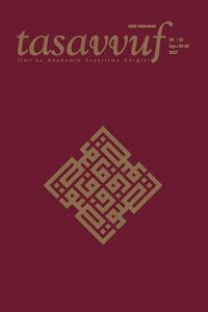18. Yüzyıl Osmanlı Kelâmcı ve Mantıkçısı İsmâil Gelenbevî‟nin varlık Nazariyesi (Vahdet-i Vücûd Savunması)18. Yüzyıl Osmanlı Kelâmcı ve Mantıkçısı İsmâil Gelenbevî'nin varlık nazariyesi (Vahdet-i Vücûd savunması)
The theory of existence of İsmail Kalanbawi who is the Ottoman scholar of the word(kalam) and the logic in 18th century (defense of unity of being/wahdat al wujud
___
- Afîfî, Ebu’l-Alâ, Muhyiddin İbnu’l-Arabi’nin Tasavvuf Felsefesi, çev.: Mehmet Dağ, İstanbul 1999.
- Atay, Hüseyin, İbn-i Sina’da Varlık Nazariyesi, Ankara 1983.
- Bayraktar, Mehmet, ‚İbnArabi’de Varlığın Birliğinin Ontolinguistik Analizi‛, A.Ü.İ.F.D., c.XXV, Ankara 1981.
- Curcâni, Şerif Ali bin Muhammed, et-Ta’rîfât, (ofset), ts.
- Ebu’l-Bekâ, Eyyûb el-Kefevî, el-Külliyât, 1287.
- (Ertuğrul) , İsmâil Fennî, Vahdet-i Vücûd ve İbn Arabî, haz.: Mustafa Kara, İstanbul 1991.
- Eş’ârî, Ebu’l-Hasan, el-İbâne, Beyrut 1981.
- Eş’ârî, Ebu’l-Hasan, Makâlât, haz.: Helmut Rihter, Wiesbaden 1981.
- Gelenbevî, İsmâîl, Hâşiyetun ale’l-Celâl, İstanbul 1323.
- Gelenbevî, İsmail, Risaletun fi Vahdeti’l-Vücûd, Süleymaniye Ktb. Esad Efendi Böl. no: 3502.
- Isfehânî, Râgıb, el-Müfredat, Beyrut 1991.
- İbn Arabî, Muhyiddin, el-Futûhâtu’l-Mekkiyye, Mısır 1293.
- Kâdı Abdülcebbâr, Şerhu Usûli’l-Hamse, Kahire 1988.
- Kam, Ferid, Vahdet-i Vücûd ve Panteizm (İbn-i Arabî’de Varlık Düşüncesi), İstanbul 1992.
- Keklik, Nihat, Sadreddin Konevî’nin Felsefesinde Allah, Kâinat ve İnsan, İ.Ü.E.F.Y., İstanbul 1967.
- MacDonald, B. D., ‚Hakikat‛, İA, c. V, İstanbul 1976.
- Maturîdî, Ebû Mansûr, Kitabu’t-Tevhîd, İstanbul 1979.
- Teftezânî, Sa’duddin, Şerhu’l-Akâid, ts.
- Teftezanî, Sa’duddin, Şerhu’l-Mekâsıd, 1305.
- Tehânevî, Muhammed Ali, Keşşâfu Istılâhâti’l-Fünûn, (ofset) İstanbul 1984.
- ISSN: 1302-3543
- Yayın Aralığı: 3
- Başlangıç: 1999
- Yayıncı: İSTANBUL SABAHATTİN ZAİM ÜNİVERSİTESİ
İmâm-ı Rabbânî'ye göre vahdet-i vücûd ve vahdet-i şuhûd
İmam Rabbânî perspektifinden İbnül-Arabî'ye tenkidî bir yaklaşım
Muhyiddin İbnü'l-Arabî'nin İbn Rüşd ile görüşmesi
Bediüzzaman Said Nursi'nin Muhyiddin İbnü'l-Arabî ve vahdet-i vücud hakkındaki düşünceleri
İbnü'l-Arabî öncesi Endülüs'te tasavvuf
